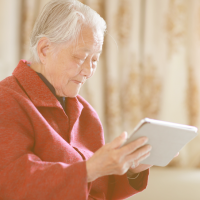
Video calls for reducing social isolation and loneliness in older people
Full review here
Read the Evidently Cochrane blog
Listen to the Spanish podcast; English podcast; Croation podast; Simplified Chine podcast
Many countries have introduced restrictions on people’s movement to protect them from COVID-19. Visiting older friends and relatives may not be possible. Can calling Grandma with a video call help her feel less lonely and isolated? Can video calls affect symptoms of depression or quality of life? What does the evidence say?
COVID-19 is spreading rapidly, so we needed to answer this question quickly. This Rapid Review was done in a short space of time as part of Cochrane’s organizational effort to meet the need for up-to-date summaries of evidence to support decision-making in combating the effects and impact of COVID-19
The review authors looked for studies that randomly allocated older people to different groups to use either video calls, another method of keeping in touch, or no particular method (usual care), with the aim of examining their effects on loneliness or social isolation. For this review they considered older people to be aged 65 years or above and considered video calls to be calls made via the internet, using computers, tablets or smartphones.
The team included three studies, with 201 participants, in this review. All three studies took place in nursing homes in Taiwan between 2010 and 2020 and compared video calls to usual care.
